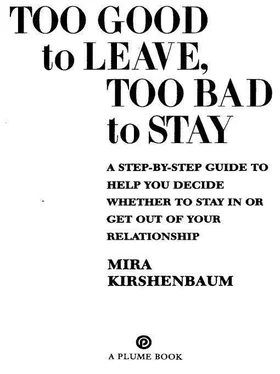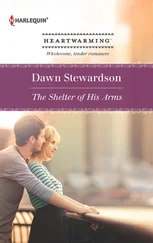Kirshenbaum, Mira - Too Good to Leave, Too Bad to Stay
Здесь есть возможность читать онлайн «Kirshenbaum, Mira - Too Good to Leave, Too Bad to Stay» весь текст электронной книги совершенно бесплатно (целиком полную версию без сокращений). В некоторых случаях можно слушать аудио, скачать через торрент в формате fb2 и присутствует краткое содержание. Жанр: Психология. Описание произведения, (предисловие) а так же отзывы посетителей доступны на портале библиотеки ЛибКат.
- Название:Too Good to Leave, Too Bad to Stay
- Автор:
- Жанр:
- Год:неизвестен
- ISBN:нет данных
- Рейтинг книги:3 / 5. Голосов: 1
-
Избранное:Добавить в избранное
- Отзывы:
-
Ваша оценка:
- 60
- 1
- 2
- 3
- 4
- 5
Too Good to Leave, Too Bad to Stay: краткое содержание, описание и аннотация
Предлагаем к чтению аннотацию, описание, краткое содержание или предисловие (зависит от того, что написал сам автор книги «Too Good to Leave, Too Bad to Stay»). Если вы не нашли необходимую информацию о книге — напишите в комментариях, мы постараемся отыскать её.
Too Good to Leave, Too Bad to Stay — читать онлайн бесплатно полную книгу (весь текст) целиком
Ниже представлен текст книги, разбитый по страницам. Система сохранения места последней прочитанной страницы, позволяет с удобством читать онлайн бесплатно книгу «Too Good to Leave, Too Bad to Stay», без необходимости каждый раз заново искать на чём Вы остановились. Поставьте закладку, и сможете в любой момент перейти на страницу, на которой закончили чтение.
Интервал:
Закладка:
Let me help you avoid either kind of disaster.
STEP #22: NEW REASONS TO STAY
The questions in this chapter are a little different from the ones in other chapters. The others are each essentially self-contained. The two here are based on your first taking a fresh look at your situation before you answer them.
Do this. At the top of one sheet of paper write the words: “Things I look forward to in my new life when I think about leaving.” At the top of another sheet of paper write the words: “Things I’m afraid of in a new life that make me think about staying.”
Then write down whatever has been most important to you as you’ve struggled with whether you should stay or leave. Based on the examples you’ve just read, Matt would have written something like “Dating nice sexy women” and “Having a better relationship with my kids” as things he was looking forward to. Donna would have written something like “Not having money” and “Having nowhere to live” as things she was afraid of.
In particular, when you’re writing down the things you’re looking forward to, include the specific offers of support you’re counting on from friends and family.
When you look at what you’ve written down, you’ll have the opportunity to see the picture that tunnel vision might have created for you.
Now you have the opportunity to correct that tunnel vision. For each item on your list ask yourself,
• “Is this true?”
• “Is this likely?”
Then ask yourself,
• “What else is possible?”
• “What’s most likely?”
For Matt, it was true that he could date other women once he was on his own, but what else was possible was that dates would be hard to come by and not very satisfactory, and this was more likely, too. And it wasn’t true that things would be as great with his kids as he’d imagined. Matt could have learned all this if he’d talked to other divorced men.
For Donna, it simply wasn’t true that she couldn’t support herself. The possibility that she hadn’t considered was that being on her own would force her to earn a decent living and that she could live comfortably on what she earned.
I can’t do this part for you. The specific circumstances of everyone’s life are so different. Only you know your hopes and fears and the realities that generate them. Only you have access to developing new information that will completely change your understanding of the realities you face. But you’ve got to develop this new information.
If nothing else, ask people you know whether they think your hopes and fears are realistic. What hopes and fears do they think are more realistic? You’re not asking these people about the realities inside your relationship, but about realities outside your relationship that they’re a lot more qualified to comment on.
Then ask yourself this question:
Diagnostic question #22. With your new, more complete, more realistic set of information about what it would be like for you if you left, have you discovered new, more probable realities that now make leaving seem impossibly difficult or unpleasant?
To help you develop this information, think about what awaits you by going through this checklist of issues:
• Where will you live? How will you be able to afford it? Will you be able to commute to your job from there?
• How much savings will you have available to you after you leave? How much of your income will you have available? Will that be enough?
• What are your prospects for meeting people? This is a time to be brutally honest: do you have the characteristics that’ll make it relatively easy to find dates? Will you want to go through the process of meeting new people?
• Is it realistically likely that you’ll be lonely in your new life? How well do you cope with loneliness?
• What’s going to happen with the kids? Is joint custody a possibility, and do you want it? Is not having custody likely for you; is that acceptable to you? Is having custody more likely, and have you thought through what it’s like to parent kids on your own?
• What will being on your own do to your ability to work?
• Is it realistic that the friends you’re counting on being there for you will end up being there? (The friends you had as individuals usually end up staying friends with the woman, not the man, but married friends of yours often distance themselves from both of you.)
• How do your relatives feel about what you’re wanting to do? Will they provide moral support? Perhaps more important, will they actually deliver the practical or financial support they might have been promising?
Feel free to add to this checklist whatever is most important to you in your life. Now here’s the guideline:
GUIDELINE #22
At this point in the process, as you look more realistically at what it will be like for you to leave, if this fresh look clearly makes leaving seem too difficult and makes staying seem desirable, then you’ve gotten the clarity you were looking for and you know you’ll be happier staying. Quick take: If staying makes sense when you really check into it, it makes sense to stay.
But you want to make sure you don’t fall back into ambivalence by using the balance-scale approach. This guideline is not an attempt to get you to weigh more things in the balance. It’s an attempt to help you find that one piece of overlooked reality that suddenly sheds a completely different light on everything.
If thinking more realistically about what awaits you decisively changes the way you’d been thinking about leaving, fine. If not, some other question coming up will give you clarity.
STEP #23: NEW REASONS TO LEAVE
Now go back to your two pieces of paper: “Things I look forward to in my new life when I think about leaving” and “Things I’m afraid of in a new life that make me think about staying.” Ask yourself the following question:
Diagnostic question #23. With your new, more complete, more realistic set of information about what it would be like to leave, have you discovered new, more probable realities that now make leaving seem easier, more attractive, and make staying no longer desirable?
If, for example, you’ve been convinced you have nowhere to go, is that really true? If you’ve been convinced you’ll be alone and lonely, is that true? If you’ve been convinced you won’t be able to support yourself, is that true? Use the same checklist you just used. And remember to use your friends as a source of information about what it’s really like “out there.”
Here’s the guideline:
GUIDELINE #23
If looking more realistically at what it will actually be like for you to leave your relationship clearly makes leaving seem easier and more attractive to you and makes staying seem like a bad idea, then you’ve gotten the clarity you were looking for and you’ll be happier if you leave. Quick take: If leaving makes sense when you really check into it, then it makes sense to leave.
Suppose this guideline does apply. It means that by looking more realistically at your life you’ve gotten the clarity that eluded you when you focused narrowly on your relationship alone.
No Sister
This might seem like an oddly practical chapter in a book that has focused on the emotional and psychological ins and outs of iffy relationships. But in my experience the issue I’ve raised here is extremely important. I’ll never forget a patient I had many years ago before I developed the understanding I’ve been sharing with you. She and I spent weeks talking about whether she’d be better off staying or leaving. And every time the topic came up she’d refer to her sister’s vague offer to come live with her in San Francisco as a powerful magnet drawing her out of her current relationship, as a major factor pulling the balance scale down toward leaving.
Читать дальшеИнтервал:
Закладка:
Похожие книги на «Too Good to Leave, Too Bad to Stay»
Представляем Вашему вниманию похожие книги на «Too Good to Leave, Too Bad to Stay» списком для выбора. Мы отобрали схожую по названию и смыслу литературу в надежде предоставить читателям больше вариантов отыскать новые, интересные, ещё непрочитанные произведения.
Обсуждение, отзывы о книге «Too Good to Leave, Too Bad to Stay» и просто собственные мнения читателей. Оставьте ваши комментарии, напишите, что Вы думаете о произведении, его смысле или главных героях. Укажите что конкретно понравилось, а что нет, и почему Вы так считаете.












